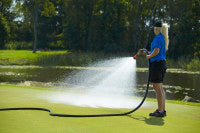Early start stops stress

Syngenta Turf Technical Manager, Marcela Munoz, highlighted the benefit of deep and even soil moisture holding in the root zone early in the season would be especially important where prolonged dry spring weather in recent years had seriously affected root growth and plant recovery.
"Furthermore, Qualibra will help turf plants make the most effective use of available moisture where turf managers are reluctant to initiate early irrigation, for fear of creating soft surfaces or triggering disease," she added.
Where the unique formulation of Qualibra performs differently to other wetting agents is the combination of moving surface water down, to maintain firm and fast surfaces, along with holding soil water lower in the root zone to enhance conditions for root and plant health.
New 2016 recommendations for Qualibra use on fairways advises starting the programme at 20l/ha, and then repeating at six week intervals at a lower rate of 1l/ha. This early-start approach ensures turf and soils get the same beneficial total application rate, but over an extended season for consistent results.

"Once you start to visibly see the onset of stress induced symptoms, the plant is already suffering and damage to playing surface quality will result. It takes time and energy for the plant to recover," she advised. "Every effort should be made to pre-empt stress and alleviate the conditions before it occurs."
Importantly, holding water evenly in the root zone limits the development of hydrophobic zones. Ensuring the turf's root hairs remain in contact with soil moisture is essential to help with efficient water uptake, as well as increase the uptake of nutrients that will further reduce the risk of stress.

Trials have shown that Qualibra programmes can give an 11% improved uptake of applied nutrients - which is beneficial to the plant and reduces any environmental loss through groundwater. "The improved uptake of nutrients is attributed to a greater root mass and soil moisture being held in the rootzone for longer," said Ms Munoz.
Syngenta Turf Business Manager, Daniel Lightfoot, pointed out that cumulative effect of the Qualibra programme started in early spring can be especially beneficial in providing the optimal soil conditions for root retention through the summer.
"Hot, dry soil conditions can lead to significant reduction in the root mass, as plants draw on the carbohydrate reserves to maintain growth," he warned. "Long summer growing days can make the problem particularly severe, along with the pressure of longer hours of play."
Better root retention by holding water evenly in the rootzone over the summer could allow for a greater build-up of carbohydrate reserves in the autumn, which has been shown to significantly improve over-winter survival.

Daniel advocated treatment was best applied in a water volume of 400 litres per hectare, and then watered in as soon as possible with two to three mm of irrigation. If no irrigation was available, it could be beneficial to increase the application water volume, he added.
